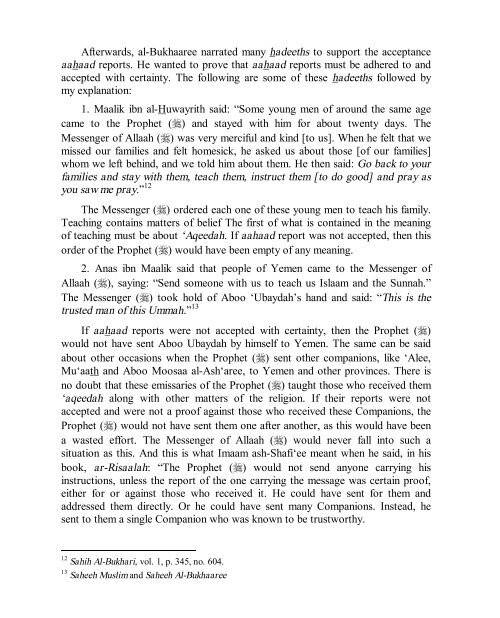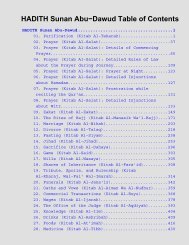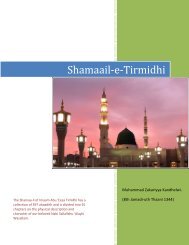Afterwards, <strong>al</strong>-Bukhaaree narrated many hadeeths to support the acceptanceaahaad reports. He wanted to prove that aahaad reports must be adhered to andaccepted with certainty. The following are some of these hadeeths followed bymy explanation:1. Ma<strong>al</strong>ik ibn <strong>al</strong>-Huwayrith said: “Some young men of around the same agecame to the Prophet (r) and stayed with him for about twenty days. TheMessenger of Allaah (r) was very merciful and kind [to us]. When he felt that wemissed our families and felt homesick, he asked us about those [of our families]whom we left behind, and we told him about them. He then said: Go back to yourfamilies and stay with them, teach them, instruct them [to do good] and pray asyou saw me pray.” 12The Messenger (r) ordered each one of these young men to teach his family.Teaching contains matters of belief The first of what is contained in the meaningof teaching must be about ‘Aqeedah. If aahaad report was not accepted, then thisorder of the Prophet (r) would have been empty of any meaning.2. Anas ibn Ma<strong>al</strong>ik said that people of Yemen came to the Messenger ofAllaah (r), saying: “Send someone with us to teach us Islaam and the Sunnah.”The Messenger (r) took hold of Aboo ‘Ubaydah’s hand and said: “This is thetrusted man of this Ummah.” 13If aahaad reports were not accepted with certainty, then the Prophet (r)would not have sent Aboo Ubaydah by himself to Yemen. The same can be saidabout other occasions when the Prophet (r) sent other companions, like ‘Alee,Mu‘aath and Aboo Moosaa <strong>al</strong>-Ash‘aree, to Yemen and other provinces. There isno doubt that these emissaries of the Prophet (r) taught those who received them‘aqeedah <strong>al</strong>ong with other matters of the religion. If their reports were notaccepted and were not a proof against those who received these Companions, theProphet (r) would not have sent them one after another, as this would have beena wasted effort. The Messenger of Allaah (r) would never f<strong>al</strong>l into such asituation as this. And this is what Imaam ash-Shafi‘ee meant when he said, in hisbook, ar-Risa<strong>al</strong>ah: “The Prophet (r) would not send anyone carrying hisinstructions, unless the report of the one carrying the message was certain proof,either for or against those who received it. He could have sent for them andaddressed them directly. Or he could have sent many Companions. Instead, hesent to them a single Companion who was known to be trustworthy.12 Sahih Al-Bukhari, vol. 1, p. 345, no. 604.13 Saheeh Muslim and Saheeh Al-Bukhaaree
3. ‘Abdullaah ibn ‘Umar said: “While the inhabitants of Qubaa where prayingFajr, a man came to them and said: ‘[Verses of the] Qur’aan have been reve<strong>al</strong>ed tothe Messenger (r) tonight, and he was ordered to face the Ka‘bah [duringprayer], so face it.’ Their faces were towards Shaam, but they turned [their faces]towards Ka’bah.” 14This hadeeth is textu<strong>al</strong> evidence that the Companions accepted the aahaadreport that nullified facing Jerus<strong>al</strong>em during prayer… If they did not accept theaahaad report with certainty, why would they contradict what they knew forcertain concerning their origin<strong>al</strong> prayer direction? Ibn <strong>al</strong>-Qayyim noted:“Furthermore, the Messenger of Allaah (r) did not criticize them. On thecontrary, they were praised for this action.”4. Sa‘eed ibn Jubayr related that he informed Ibn ‘Abbaas that Nawf <strong>al</strong>-Bakk<strong>al</strong>i was claiming that Moses, the companion of <strong>al</strong>-Khidr, was not Moses ofthe Israelites. Ibn ‘Abbaas replied: “That enemy of Allaah has lied. Ubayy ibnKa‘b informed me that the Messenger of Allaah (r) stood and said...” and hementioned the hadeeth of Moses and <strong>al</strong>-Khidr in a way that proves that Moses[sent to the Children of Israel] was the same Moses who accompanied <strong>al</strong>-Khidr. 15Ash-Shaafi‘ee said: “Ibn ‘Abbaas, as knowledgeable and pious as he was,accepted the report by Ubayy ibn Ka‘b from the Messenger of Allaah (r). Heeven c<strong>al</strong>led a Muslim a liar. This is because Ubayy ibn Ka‘b told him from theProphet (r) what clearly indicates that Moses, who was sent to the Children ofIsrael, was the same one who accompanied <strong>al</strong>-Khidr.”The above saying by Imaam ash-Shaafi‘ee is clear evidence that he did notdifferentiate between ‘aqeedah and laws with regards to aahaad reports. Todecide whether Moses, of the Children of Israel, was the companion of <strong>al</strong>-Khidror not, is a matter of the unseen and not a matter of laws and actions, as is evident.What further supports this conclusion, is that ash-Shaafi‘ee included an importantchapter in his book, ar-Risa<strong>al</strong>ah, entitled “Chapter: Evidence for the Necessity ofAccepting the Aahaad Report.” In this chapter, he introduced many gener<strong>al</strong>proofs from the Qur’aan and the Sunnah which confirm that the aahaad reportmust <strong>al</strong>so be accepted in matters of ‘aqeedah. Furthermore, the Imaam’sexplanations of these proofs are gener<strong>al</strong> and include accepting hadeeth aahaad inmatters of ‘aqeedah. He ended the chapter with the following statement: “Thereare many hadeeths, with regards to accepting the aahaad report. I have introducedsufficient evidence to this fact. This is the way of our S<strong>al</strong>af, and the generationsthat followed, until our current generation. This is the [correct] way. Also, this14 Saheeh Al-Bukhaaree, and Saheeh Muslim.15 Saheeh Al-Bukhaaree and Saheeh Muslim.
- Page 2:
[Usool Al Hadeeth]The Methodology o
- Page 6 and 7:
from the Prophet of his actions, sa
- Page 8 and 9:
3. LawsOne of the primary duties of
- Page 10 and 11:
authentically attributable to the P
- Page 12 and 13:
was asked which city will be conque
- Page 14 and 15:
Rahmaan, who was at that time the m
- Page 16 and 17:
centuries. They also grouped the ha
- Page 18 and 19:
Prophet's lifetime, and in the wars
- Page 20 and 21:
JAABIR IBN ‘ABDILLAAH. One of the
- Page 22 and 23:
2. ‘Ard : Reading by the Students
- Page 24 and 25:
Transmission TerminologyThe hadeeth
- Page 26 and 27:
EVOLUTION OF THE SANADTeaching the
- Page 28 and 29:
the Sahaabah had left off and began
- Page 30 and 31:
In this case the Sanad is shorter b
- Page 32 and 33:
The Pattern of IsnaadThe usual patt
- Page 35 and 36:
Origins of the Isnaad SystemEvery t
- Page 37 and 38:
FOUR: ClassificationDue to a variet
- Page 39 and 40:
Hadeeth SaheehA hadeeth must meet t
- Page 41 and 42:
Saheeh li GhayrihThe hadeeth saheeh
- Page 43 and 44:
ecorded by others.5. Authentic hade
- Page 45 and 46:
Abee Awfaa wrote to him saying that
- Page 47 and 48:
Muhammad ibn Bashshaar informed us
- Page 49 and 50:
Ruling on Da‘eef NarrationsSchola
- Page 51 and 52: In this narration, he deleted the c
- Page 53 and 54: called Taghleeq at-Ta‘leeq (Closi
- Page 55 and 56: The jurists (fuqahaa) generally def
- Page 57 and 58: Caesar’s emissary collected by Ah
- Page 59 and 60: Muwatta 42 with the following chain
- Page 61 and 62: Saqiyah called him Aboo Wahb al-Asa
- Page 63 and 64: Khateeb al-Baghdaadee’s book call
- Page 65 and 66: The Mu’annan is a hadeeth in whic
- Page 67 and 68: and the household of the Prophet (r
- Page 69 and 70: The supporters of each opinion fabr
- Page 71 and 72: (Soorah al-Israa, 17: 79) he said t
- Page 73 and 74: 7. Inventions for Personal Motives:
- Page 75 and 76: Zamakhasharee and ash-Shawkaanee.Li
- Page 77 and 78: definitions by other scholars are:1
- Page 79 and 80: FIVE: ConflictIn vast number of nar
- Page 81 and 82: farewell Hajj as well as on other o
- Page 83 and 84: caught) but on the fourth occasion
- Page 85 and 86: hadeeth narrations. So much so that
- Page 87 and 88: Mulaykah, 14 az-Zuhree 15 and Shu
- Page 89 and 90: them in ash-Sha‘bee’s direction
- Page 91 and 92: ased on the relative reliability of
- Page 93 and 94: Step Four: The eras of the narrator
- Page 95 and 96: ) متواتِر بِال ْمعن
- Page 97 and 98: have even claimed Ijmaa‘ (unanimi
- Page 99 and 100: What further explains this Qur’aa
- Page 101: Bukhaaree - the most correct book a
- Page 105 and 106: of scholars. It is false because it
- Page 107 and 108: This hadeeth was narrated from Anas
- Page 109 and 110: the view that discrepancies between
- Page 111 and 112: EIGHT: LiteratureThe origins of the
- Page 113 and 114: collected hadeeths which were relat
- Page 115 and 116: Ibn Hambal began lecturing on tradi
- Page 117 and 118: students, and also to his sons and
- Page 119 and 120: The final chapter is on Shamaa’il
- Page 121 and 122: On many occasions al-Bukhaaree’s
- Page 123 and 124: Saheeh of Muslim ibn al-Hajjaaj ibn
- Page 125 and 126: have examined 500,000 hadeeths, and
- Page 127 and 128: Islamic world. 43 Sunan Abee Daawoo
- Page 129 and 130: them on account of its isnaad. I he
- Page 131 and 132: Muslim. 56 The book does, however,
- Page 133 and 134: Ad-Daaraqutnee rapidly acquired a s
- Page 135 and 136: men had to be appointed to repeat h
- Page 137 and 138: The Zawaa’id Work of al-Haythamee
- Page 139 and 140: (iv) They had been used as a basis
- Page 141 and 142: the well-known Kitaab al-Ansaab of
- Page 143 and 144: notices of more than 40,000 narrato
- Page 145 and 146: Zaynud-Deen al-‘Iraaqee (725-806/
- Page 147 and 148: forced to leave the city and wander
- Page 149 and 150: the author. But the work could not
- Page 151 and 152: TEN: Women Scholars of HadeethHisto
- Page 153 and 154:
daughter of the distinguished juris
- Page 155 and 156:
turn lectured to many students, som
- Page 157 and 158:
excelled in the art of calligraphy
- Page 159 and 160:
occurs only in Mutayyin’s narrati
- Page 161 and 162:
Abu Bakr as-Siddeeq, then to Ali ib
- Page 163 and 164:
ف َأ َمسك َها ف َل
- Page 165 and 166:
Haakim, Muhammad ibn ‘Abdillaah a
- Page 167:
Thahabee, Muhammad ibn Ahmad ath-.





